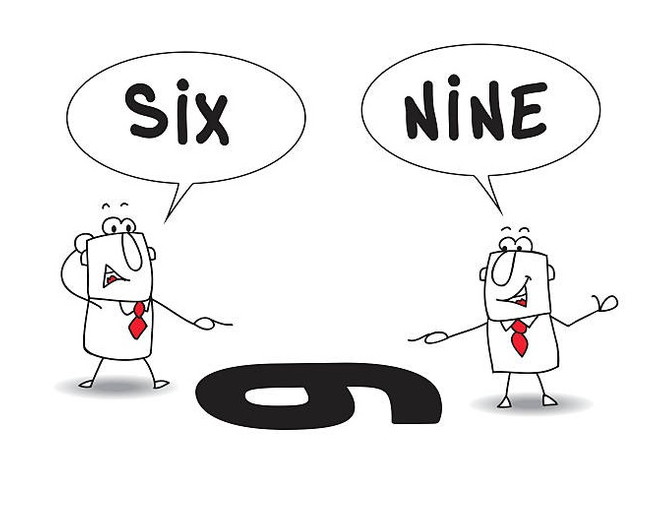Does Truth Depend on Perspective?

Recently I took a class on the subject of communicating about culturally sensitive issues.[1] At one point, the instructor showed a cartoon like the one above and explained it as follows:
“Alfred and Mateo are looking at an image. Now, Alfred is looking at the image from the left side, and he clearly sees the number six. Mateo is standing on the other side of the object. From the right, it appears to be the number nine. Alfred insists he sees a six, and Mateo is certain the number is nine. Who’s right? Well, it depends on your perspective. When it comes to an example as simple as this, it’s easy to see that two reasonable people can look at the same scenario and have a different viewpoint.”
Now, it might have been my imagination. But it felt like the instructor was saying that truth can depend on a person’s perspective. Can the truth about an object or subject be different depending the person looking at it? Consider the phrase “that may be true for you, but not for me.” Is truth subjective in this way?
The short answer is no. The whole truth about something will be the same for everyone.
Let’s define some terms. What is truth?
Historically, the most popular theory of truth is the correspondence theory. It says that a proposition is true if it corresponds to the way the world is.[2] That is, truth corresponds to reality. Truth is simply telling it like it is. Now a relative view of truth says that something could be true for one person but not for another. An absolute view, on the other hand, says that if something is true for one person, it is true for everybody everywhere.[3] As we will see, understanding the context of a statement is very important in deciding if it’s true.
Let’s take a closer look at our cartoon. Alfred sees a six, so this is true for Alfred. It is also true for Mateo that Alfred sees a six. In fact, that Alfred sees a six is true for everybody everywhere. The context tells us that it’s a question of whether Alfred sees the six, not whether other people do too.
The same goes for Mateo. Mateo sees a nine. That Mateo sees a nine is also true for Alfred. Actually, for everybody everywhere it’s true that Mateo sees a nine.
They’re both right, aren’t they? But each has only part of a larger truth. The whole truth is that they are dealing with an object that can look like a six from one direction and a nine from the other. That the object can look like both a six and a nine is true for everybody, everywhere.
There is no relative truth in our cartoon, only absolute truths.
I guess what bothers me is the phrase “that may be true for you, but not for me.” But I think when people say this, it’s just a casual misuse of terms. What people mean to say, and should say, is, “That may be what you believe, and I’m sure you believe it’s true. But I don’t believe that, and I don’t think it’s true.” That would make for a more honest conversation. And I think people know that.
No, truth is not subjective. Truth is not defined by perspectives that may be limited, nor conclusions that may even be wrong. Truth stands on its own. Truth is absolute.
As for my class, I won’t read too much into what the instructor said. After all, she never said that the truth was relative. She only pointed out that both Alfred and Mateo were right. And that’s true!
But there’s a deeper lesson. The instructor continued, saying, “In order for Mateo to see things as Alfred does, he would literally, or figuratively, need to walk over to the other side of the object and put himself in Alfred’s shoes, to attempt to understand Alfred’s viewpoint.”
Perhaps one of the best things we can do is try to understand each other’s point of view. Especially when it comes to culturally sensitive issues. It doesn’t mean we have to change our own perspective. But when we listen to each other, maybe then we’ll be on our way to understanding the larger truths together.
What remains to be seen is if the truth about reality is even knowable. We will explore that in our next post.
[1]Dr. Daisy Lovelace, course title “Communicating about Culturally Sensitive Issues,” offered by LinkedIn Learning.
[2]Bradley Dowden and Norman Swartz, “Truth,” Internet Encyclopedia of Philosophy, available at https://www.iep.utm.edu/truth/, accessed 6/4/20.
[3]Dr. Norman L. Geisler, “Truth, Nature of,” Baker Encyclopedia of Apologetics (Grand Rapids, MI: Baker, 1999), 742-743.
Bravo… well said.